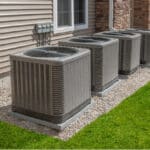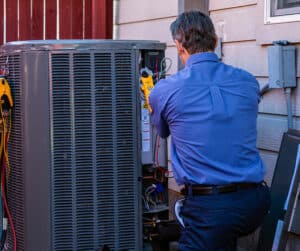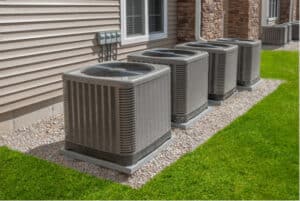If you want your home to be cool and comfortable in summer and warm and cozy in winter, you will need some type of HVAC system. Central heating and air is often the first choice, but mini splits offer a lot of advantages in the right home.
Find out more about heating and cooling mini splits, what they’re suitable for, and whether they’re the right choice for you.
What Is a Mini Split System?
Conventional HVAC and mini splits, or ductless systems, are similar in their operation for heating and cooling, but they differ in how they’re installed and how they deliver warm or cool air to your home.
Both systems have an outdoor compressor/condenser and an indoor air handler, but mini splits may have multiple air handlers to control temperature in different areas. They’re connected through copper lines with coolant coils that circulate refrigerant through the system, absorbing heat and humidity and transferring it outside. The cooled air is then pumped directly into your home without ducts, whereas conventional HVAC forces cooled air through ducts.
If you’re trying to maintain a consistent temperature across a large home, conventional HVAC is often the best choice. While ductless mini splits can be used for whole-home cooling and heating, they tend to be the best choice if you’re looking for zoned temperature control.
Why Choose a Mini Split System?
The unique advantages that ductless systems have is primarily for cooling individual spaces and working in older or renovated homes. These systems can provide zoned temperature control with multiple air handler units and individual thermostats, all of which connect to the outdoor unit.
With these systems, you can optimize your energy usage by only heating or cooling the areas that are occupied, rather than maintaining a consistent temperature throughout your home. So, if you have areas that you don’t heat or cool, or your family members want their own space cooler or warmer, a ductless system gives you this customization.
During installation, mini splits are much faster and simpler. Instead of extensive renovations with ductwork, mini splits only require a small hole to connect the indoor and outdoor components. You can put the outdoor condenser where it works best, whether that’s a hidden spot or closer to the air handlers, which isn’t necessarily possible with central heat and air.
If you have an older home, you probably don’t have existing ductwork. This is also true if you’ve converted rooms or added rooms on, which would require ductwork. You also have options for where you put your air handlers to keep them out of sight or convenient to access.

Is a Mini Split System the Right Choice for You?
As mentioned, mini splits offer advantages over conventional HVAC in certain situations, but that doesn’t mean they’re the best choice for every home. Here’s how you should decide if you would be better off with a mini split:
Does Your Home Have Ductwork?
If you have a newer home or an existing HVAC system, you already have ductwork that can be used for your installation or upgrade without a lot of extra work. If you don’t, such as with an older home or major additions, you will need to install the ductwork for your conventional HVAC. Ductless may be best for these homes, as you can just install the air handlers without the added costs of ductwork.

Do You Struggle to Cool Certain Rooms?
If your home has rooms that are more difficult to keep warm or cool, whether it’s due to the connection to the main part of the house, your climate, or the direction they face, it could have a significant impact on your home comfort and energy bills. Ductless systems are often a good choice in these situations to ensure these rooms have consistent temperatures without overworking your main system.
Do You Need Zoned Temperature Control?
Most people can’t agree on the ideal temperature, but with central HVAC, you don’t have a lot of choice. Instead of arguing over the thermostat, ductless systems provide precise temperature control for specific zones of your home to keep everyone comfortable. This is especially important if you have babies, elderly family members, or people with health conditions that may need their space warmer or cooler.
Do You Have Unoccupied Space?
If you have rooms in your home that you don’t use, there’s no need to pump cool air into them. You can block off your HVAC system to keep the air contained to the occupied spaces, but that’s added work and the ducts can develop mold from sitting stagnant. Ductless systems give you the flexibility to focus your heating and cooling only to the occupied areas.
Are you looking to install a ductless mini split? Contact the pros at Service Wizard to schedule your appointment?









